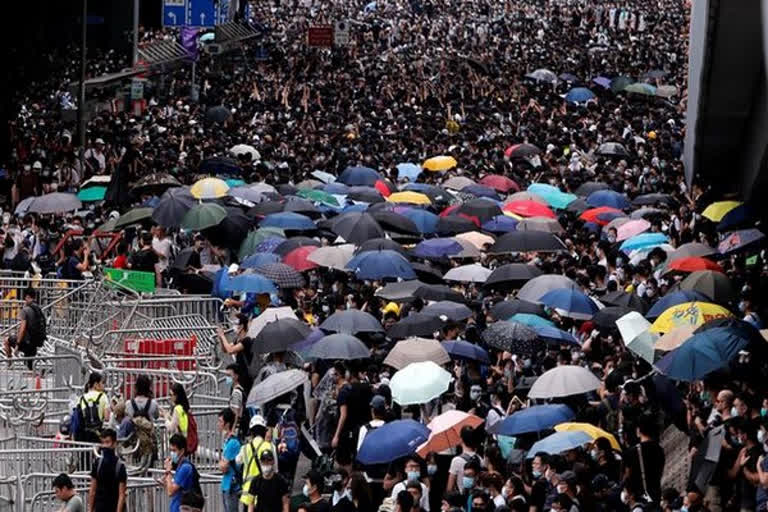Tokyo: Protesters took to streets of Hong Kong on Wednesday, to continue demonstrations against the controversial extradition bill according to which criminal suspects will be sent to mainland China for trial.
This comes as lawmakers are slated to hear a second reading of the bill along with holding a debate on it.
5,000 police personnel in anti-riot gear have sealed all entrances of the Hong Kong's Legislative Council building, around which the protests are being held.
The demonstrators have blocked roads around the complex and have erected barriers to hamper the arrival of additional policemen.
Marking the biggest march in Hong Kong in the past 15 years, around a million people took to Hong Kong's streets on Sunday to protest against the bill which has been defended by the region's pro-Beijing leader, Chief Executive Carrie Lam.
"This is a very important piece of legislation that will help to uphold justice and also ensure that Hong Kong will fulfil her international obligations in terms of cross-boundary and transnational crimes," Lam had said previously.
The protests took a violent turn on Monday as several hundred protesters clashed with police around Hong Kong's parliament.
Ignoring the huge public backlash, Lam said that her administration had already made major concessions to ensure protection of city's unique freedom and that the human rights safeguard bills meet international standards.
"I and my team have not ignored any views expressed on this very important piece of legislation. We have been listening and listening very attentively," she said.
Calls for her resignation have been rampant throughout the protests against the document which was proposed on April 3.
Critics believe that the bill will leave anyone on Hong Kong soil vulnerable to being grabbed by the Chinese authorities for political reasons or inadvertent business offences.
They further said that the newly framed extradition plan would dissolve the rights and legal protections, which were guaranteed under the city's handover from British colonial rule to Chinese sovereignty in 1997.
The vast majority of protesters is made up of young people of high school or university age. Multiple pro-independence groups, including localist political party Youngspiration, are amongst those protesting today. The party, along with Hong Kong Indigenous, started the protests on Tuesday night.
Several appeals have been made for peaceful protests, with the leaders from the Civil Human Rights group urging demonstrators to "not confront police."
The respective governments of countries like UK, USA, Singapore, Thailand and Taiwan have issued travel advisories to their citizens in the wake of the protests.
Read more: Coup leader Prayuth Chan-ocha takes office as Thai PM



